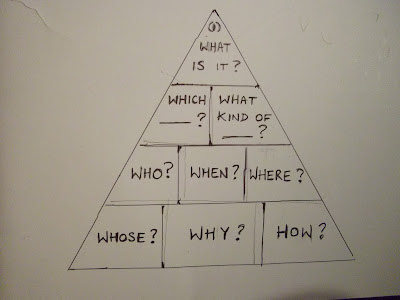In schools, how often are students graded on their ability to ask questions? How often are they tested on their ability to check? Clearly, the usual education systems see no real value to communication as they ignore half of what it takes for it to be most effective.
Here's Bela with some interesting ideas about life:
Why is asking and checking so vital to communication? Because communication always works like this:
Information -------------> Idea
Any information gives an idea. And any information can always give more than one idea. Naturally then, we will often need to ask and check in order to try to better understand the idea. As an example let's take this statement from former British Prime Minister Tony Blair to a Labour Party conference in 1996: "Ask me my three priorities for government and I tell you: education, education,education."
This information, like any information, leads to ideas. So did the audience at the party conference, which mostly consisted of University graduates, ask and check in order to better understand Tony's idea? Did anybody ask him for his definition of "education"? Or did they rise like the front rows of a Bros concert and give him a standing ovation?
It's not difficult to guess what happened if we consider how "educated" people are generally trained not to ask and check about certain basic things.
Tony got into power, and nearly 20 years later his idea of "education" still has the consistency of Dracula in gaseous form. We are not allowed anything solid, for then we might be able to understand the idea and could do something about it.
Bela Lugosi's pyramid.
The universe, and everything in it, most basically consists of information. And all that information can be simply expressed like this:
If we wish to try to understand anything, then we need the information in Bela's pyramid.
It always starts with: "What is it?" Yet, as we are usually not encouraged to ask, the simple and natural desire to find out what something is, is often squashed, and people are often left with ideas that are simply presented to them. Ideas that usually don't help us understand much.
To take the simple example of Gaza; in order to have a better idea of the problems there, we would first need to understand what it is. Is it a place where nut-cases fire AK-47s randomly into the air, or is it "the world's largest open-air prison"?
It is an interesting exercise to actually ask people what they think things are, as it quickly becomes clear that people don't often apply the simple question: "What is it?" to the information that rolls across our screens.
But never fear, for the great Tony Blair, that good Christian man, is a special peace envoy to the Middle East!
Hang on... he's a war criminal isn't he? Or is he?
A war criminal? What is it? Surely it's not one of us?
Definition of terms is a corner-stone of critical thinking and the question, what is it? is at the apex of Bela Lugosi's pyramid. If we are to make any serious effort to understand anything at all, we need to find the information in the pyramid. Finding that, we can have a better idea whether someone like Tony Blair is a great man, a war criminal, or just some kind of dangerous vampire. Hmm... perhaps the stakeholder society is a good idea.
But of course, because any information gives many ideas, there's always another opinion. Here's another, more musical, view of Bela Lugosi:




.jpg)
This 'definition of education' thing certainly seems to perplex people. I posted (another) comment about it on CiF yesterday, and I was met with the response below:
ReplyDeletehttp://www.guardian.co.uk/commentisfree/2013/jun/12/sit-exam-stoned-facts-michael-gove#comment-24296150
Why is it 'traditionalists' find the idea of defining education such a difficult subject? It seems to me an utterly basic requirement if you are going to entrust the future of society to those who are doing the educating.
The guy's idea seems to be that: "we don't have to define carrots so why do we have to define education?" I would suggest that we don't have to define carrots because there is not a lot of disagreement about what they are. On the other hand, of course, there are many views on what constitutes "education" and if we are going to discuss it we need to let the interlocutor know what we are on about.
ReplyDeleteAlso, if this man's local supermarket started selling blocks of wood painted orange as "carrots" wouldn't he mind?